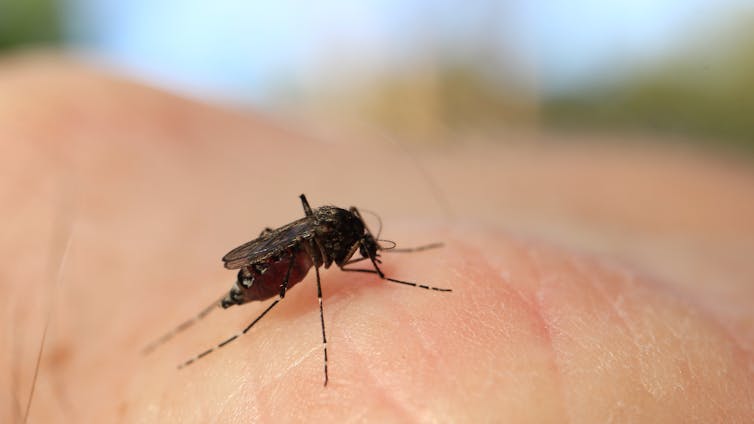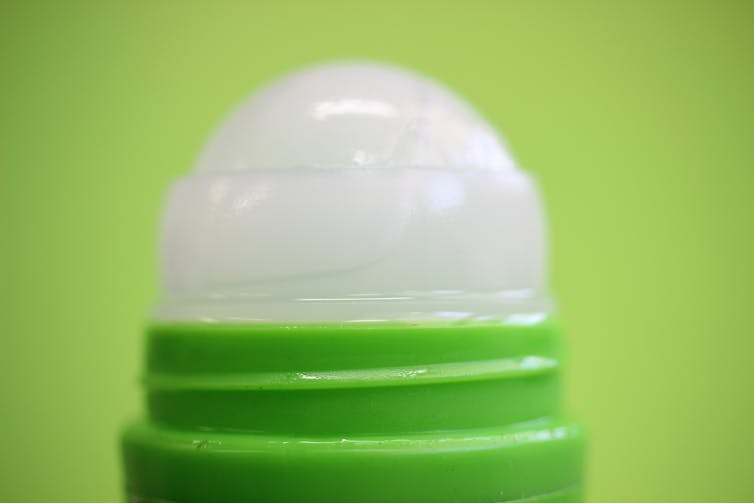Mozzies biting? Here's how to choose a repellent (and how to use it for the best protection)
- Written by Cameron Webb, Clinical Associate Professor and Principal Hospital Scientist, University of Sydney
Mosquitoes are an inevitable part of the Australian summer. And this year, with COVID a consideration, we might be spending more time outdoors than usual.
Supermarkets and pharmacies are stocked with a wide range of insect repellents including aerosols, creams, gels, sprays, roll-ons and wipes. There are even wristbands, fabric sprays, coils, sticks, plug-in devices and smartphone apps.
But not all products that purport to protect us from mosquito bites are equal.
So, how do you choose and use a repellent to best protect you and your family from mosquito bites?
The key ingredients
Health authorities around Australia recommend using insect repellents that you apply directly to exposed skin to prevent mosquito bites and reduce the risk of mosquito-borne diseases.
All insect repellents sold in Australia must be registered with the Australian Pesticides and Veterinary Medicines Authority (APVMA), which checks that products are safe and effective.
Despite the wide range of formulations available, there are only a small number of active ingredients registered for use. So any insect repellent on the shelves in Australia will contain at least one of these ingredients.
 Spending more time outdoors means a greater chance of mosquito bites.
David Todd McCarty/Unsplash
Spending more time outdoors means a greater chance of mosquito bites.
David Todd McCarty/Unsplash
Diethyltoumide (DEET) is one of the most widely used and recommended repellents across the world. It effectively prevents mosquito bites and has repeatedly been shown to have minimal adverse side effects if used as directed.
DEET formulations in Australia are available in a range of concentrations, as low as 10% through to “heavy duty” or “tropical strength” products that may be as high as 80%.
Picaridin is a common ingredient in local mosquito repellent formulations and effectively reduces mosquito bites. Like DEET, it has been assessed as safe to use. Most formulations in Australia have concentrations of less than 20%.
Oil of lemon eucalyptus is increasingly common in mosquito repellents. The chemical, p-menthane-3,8-diol, is derived from the leaves of the lemon-scented gum Corymbia citriodora.
This ingredient is a byproduct of the distillation process, not an essential oil extracted from the leaves of the plant. This is important, as this product is a much more effective repellent than essential oils (we’ll get to these alternatives shortly).
Formulations containing oil of lemon eucalyptus provide comparable protection to DEET-based repellents.
Read more: La Niña will give us a wet summer. That's great weather for mozzies
The active ingredient in the repellent will be listed on the packaging, along with the concentration.
Any insect repellent that contains these products should provide protection against biting mosquitoes. But the stronger the formulation, the longer the protection will last.
If you’re only outside for a couple of hours, say, in the backyard, there’s really no need for a high-concentration formulation. But if you’re going for a long bushwalk or fishing trip, pick a high-concentration product (regardless of the active ingredient).
 Mosquitoes are one of the most common insect pests in Australia.
A/Prof Cameron Webb (NSW Health Pathology)
Mosquitoes are one of the most common insect pests in Australia.
A/Prof Cameron Webb (NSW Health Pathology)
How you use it matters too
A dab here and there, or spraying repellent into the air around you, as you might a perfume, won’t provide much protection.
These products need to be applied thinly and evenly to all exposed areas of skin. Think of repellents as camouflaging us from mosquitoes on the lookout for blood.
While an aerosol or pump spray may allow for application direct from the container, you’ll need to rub creams, roll-ons and gels into your skin.
That doesn’t necessarily mean one is better than the other. But when choosing a formulation, think about which one you feel you’ll be able to apply thoroughly most easily.
Read more: Feel like you're a mozzie magnet? It's true – mosquitoes prefer to bite some people over others
What about ‘natural’ alternatives?
Some “natural” formulations that contain tea tree oil and other plant-based active ingredients have APVMA registration. Products sold at local markets or online may not be registered.
Notably, products that contain plant-based repellents generally don’t provide long-lasting protection from mosquito bites.
If you prefer to use products containing tea-tree oil or other botanical repellents, you need to be prepared to reapply much more frequently than with DEET, picaridin or oil of lemon eucalyptus formulations.
And avoid making up your own insect repellents from essential oils. Without the checks in place associated with APVMA-registered repellents, there may be a greater risk of adverse skin reactions.
 Mosquito repellents come in a range of formulations.
A/Prof Cameron Webb (NSW Health Pathology)
Mosquito repellents come in a range of formulations.
A/Prof Cameron Webb (NSW Health Pathology)
Can anything else help?
There’s no evidence mosquito-repellent wristbands or smartphone apps will protect you from mosquito bites.
A range of candles, coils, sticks, plug-in and fan devices and insecticide-treated clothing offer varying assistance in reducing mosquito bites. But unfortunately, none of these provides complete protection and are always best combined with topical mosquito repellents.
Read more: What can I eat to stop mosquitoes biting me?
Some people perceive so-called “chemical” repellents as posing a risk to our health. But, in most instances, they can be safely applied to anyone over 12 months of age. (For babies, it’s best to provide physical protection, such as covering the stroller with a mosquito net.)
It’s also often said these traditional repellents are unpleasant to use. But even though the active ingredients haven’t changed much, the cosmetic constituents of insect repellents have greatly improved in recent years.
To get you through summer, choose a repellent formulation registered with APVMA. Pick whichever one you find easiest to spread over the skin to provide complete cover. And always check the instructions on the label.
Authors: Cameron Webb, Clinical Associate Professor and Principal Hospital Scientist, University of Sydney





